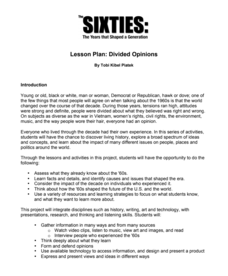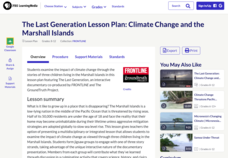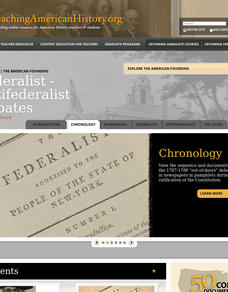New York State Education Department
Global History and Geography Examination: June 2015
Looking for a new writing prompt or primary source practice for your global history or geography class? Take a look at a helpful state standardized test for additional practice for your learners. Writing prompts include asking scholars...
New York State Education Department
US History and Government Examination: August 2015
Are your learners feeling a bit jittery about an upcoming American history standardized test? Take a look at a state standardized test to give them additional practice and ease their nerves. Extra practice includes a scaffolded...
Council for Economic Education
The Economics of Income: If You’re So Smart, Why Aren't You Rich?
If basketball players make more than teachers, why shouldn't learners all aspire to play in the NBA? Unraveling the cost and benefits of education and future economic success can be tricky. Economic data, real-life cases, and some...
PBS
Lesson Plan: Divided Opinions
To gain a more in-depth understanding of the tumultuous 1960s, young historians examine video clips, listen to music, examine images, and interview survivors. Once they have a foundation of information about the period, class members...
iCivics
Mini-Lesson: Veto Power
No means no! Scholars analyze the impact of one of the president's most powerful tools—the veto—while also finding out ways to properly check facts for validity. They research the power of the presidential veto with paired activities and...
iCivics
Mini Lesson: Supreme Court Opinions
The court of last resort. Historians research, using current cases and issues, the impact the Supreme Court of the United States has on how our nation operates. They analyze recent decisions made by the nine judges and determine how the...
Council for Economic Education
FRED and the Federal Budget Interactive Lesson
How can a federal debt accumulate over time? The Federal Reserve Economic Data (FRED) dashboard allows scholars to actively research each aspect of the federal budget. In pairs, they analyze economic data to determine the best way to...
iCivics
Mini Lesson: Judicial Activism and Restraint
Scholars analyze the United States judicial branch as it pertains to activism and restraint. They use research to define the roles the courts play while at the same time investigate current events to identify how the media covers those...
iCivics
Mini-Lesson: Gerrymandering
Who determines the structure of voting districts? The concept of gerrymandering brings to light the ongoing issue of how those running for office gain votes. Hands-on activities enable scholars to analyze the re-drawing of voting...
iCivics
Mini-Lesson: The Incumbent Advantage
Does the person running for re-election have an advantage over the challenger? Scholars explore the concept of incumbent advantage during elections using an informative mini-lesson explaining the legislative branch. In pairs, they...
iCivics
Mini-Lesson: Filibusters
How long can you speak without stopping? Scholars analyze the concept of a filibuster in the United States Senate using an installment of the Legislative Branch series of mini-lessons. They research recent filibuster attempts in the...
iCivics
Mini-Lesson: Presidential Succession
Who is in line for the presidency? Learners research the line of succession in the executive branch. They analyze the role the cabinet plays in a situation where the president and vice president are not able to serve. Along the way,...
iCivics
Mini-Lesson: Executive Orders
Can the President of the United States pass a law all by himself? Scholars investigate the concept of the executive order in regards to the powers of the presidency. They use current issues and events to monitor media bias while also...
iCivics
Mini-Lesson: Presidential Pardons
How do United States presidents give people second chances? Scholars research the concept of presidential forgiveness, or pardon. By completing an Executive Branch Mini-Lesson, class members get a better grasp of the power the executive...
Council for Economic Education
Economic Data Lesson: Economic Policy Options
Can you make decisions that will impact millions of people around the nation? Scholars research the role of the Federal Reserve, and its Chairman, on the economic outlook of the country. They analyze current trends in unemployment,...
Council for Economic Education
GDP Data: Is the Economy Healthy?
Does the economy needs a check-up? Scholars analyze the gross domestic product (GDP) to determine the overall health of the current economy. They use a short video clip as well as economic data to determine the current growth of the...
Council for Economic Education
Employment Data: Is the Economy Healthy?
Low unemployment is an indicator of a healthy economy—right? Current employment data and research leads scholars on a quest to find the true health of the economy. They analyze research on Payroll Employment Data and watch a short video...
Council for Economic Education
Unemployment Data: Is the Economy Healthy?
The United States will never see a time when the unemployment rate hits 0%. Why? Scholars research economic data to uncover clues hidden in the unemployment rate at any given time. A short video as well as research activities help...
PBS
The Last Generation: Climate Change and the Marshall Islands
Are some families down to their last generation? The final segment of a two-part climate change series investigates the vanishing Marshall Islands. Scholars divide into research teams to analyze three different individuals whose lives...
PBS
The Last Generation
How does climate impact the town, city, or area where people live? Scholars research the concept of climate change as it pertains to the Marshall Islands. The opening lesson of a two-part series uses interactive online resources and...
Ashbrook Center at Ashland University
Ratification of the Constitution
How difficult was it to get everyone to agree on the contents of the Constitution? Historians analyze the task of the Founding Fathers in creating the United States Constitution. They research a directory of video clips, primary sources,...
Ashbrook Center at Ashland University
Bill of Rights
Do citizens need protection from the federal government? Scholars investigate why the framers of the Constitution created the first 10 amendments and what these amendments mean to citizens of the United States more than 200 years later....
Ashbrook Center at Ashland University
Federalist - Antifederalist Debates
Who should have the power—individual states or the federal government? Scholars research the arguments of the Federalists and Anti-Federalists during the formation of the United States Constitution. Online resources, including a vast...
Ashbrook Center at Ashland University
The Constitutional Convention
Imagine sitting down with representatives of your school to write a new student handbook. What arguments would ensue? How would compromises be made to finish the project? Scholars research the Constitutional Convention using a directory...

























